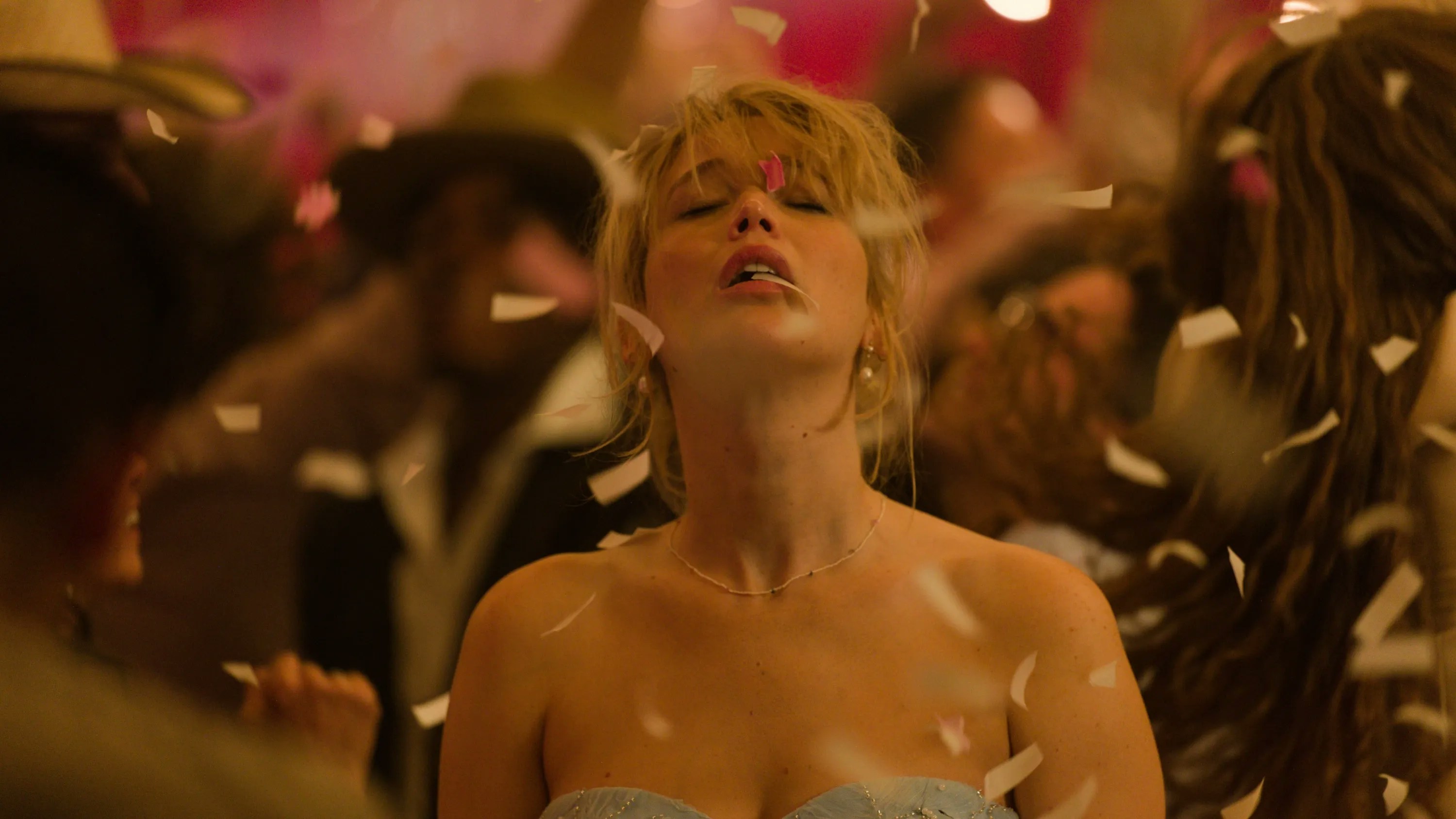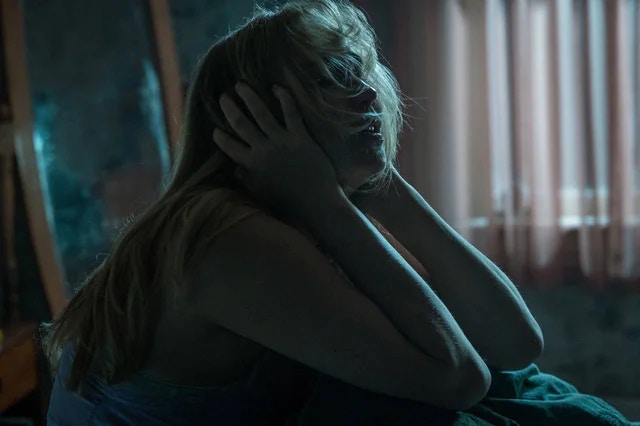
“Die My Love”: Jennifer Lawrence captures the brutality of postpartum
Words by By Anna Deutsch
Spread the Jelly was invited to an advanced screening of Die My Love (out November 7th) hosted by Mubi and Vulture.
Die My Love opens with Grace (Jennifer Lawrence) and Jackson (Robert Pattinson) moving into a decaying rural Montana home with a sordid history. The house, dilapidated and dirty, becomes a mirror for Grace herself—fragile, beautiful, and on the verge of spectacular collapse. Pregnant and seemingly in love, the couple tries to fill the crumbling space with hope, but instead it charts a woman’s descent into postpartum psychosis with terrifying intimacy.
The film’s rustic setting magnifies Grace’s isolation. The house is her cage. As she unravels, she begins to mimic a wild animal prowling through fields, licking (and eventually smashing) glass windows, and growling at her husband. Lawrence plays Grace not as a victim but as something of a beast trapped in her house and by her partner, her baby and most saliently by her own mind, in a performance that oscillates between soft tenderness and unabetted mania.


Grace is oozing with unfulfilled desire: for sex, for a creative outlet—her desire to write is alluded to several times throughout the film, but we never see her do it, let alone read or own any books—and for the dog to stop barking. (If you love our canine friends, please consider this a Trigger Warning.)
The film’s sensory world is equally unhinged. The sound design is often jarring (not unlike the shriek of a baby’s cry at 3 a.m.), keeping both Grace and the audience on edge. Costumes and styling add to the blurred sense of time, subverting highly-romanticized visions of motherhood and cottagecore into something far more sinister. Grace drifts through scenes in loose nightgowns (think Doen and Salter House), vintage Levi’s shorts and overalls, and worn in boat shoes. There’s a gritty, timeless quality—part rural America, part fever dream—that leaves you uncertain whether we’re watching reality, delusion, or something in between.
By the film’s end, we’re left suspended between life and death, wondering if Grace survives her own mind. At the Q&A following the screening, Vulture editor Rachel Handler spoke with Lawrence and Scottish director Lynne Ramsay. Lawrence delivered some of her signature bluntness (don’t miss Jia Tolentino’s profile of her in the New Yorker), riffing about going nude at four-months pregnant and how the film resonated with her as a new mother:
“Of all the movies I’ve ever done in my life this has been the most transformative—really wild stuff…I was also pregnant so there were certain realities I couldn’t see. I was told suicide is the number one cause of death in mothers, and I couldn’t see that. When I rewatched the film nine months pregnant I realized how much of it wasn’t real and was a fever dream. Then I had my second one and I had really bad postpartum, which I hadn’t had before. Watching it during that stage was an otherworldly experience.”

"There’s a gritty, timeless quality—part rural America, part fever dream—that leaves you uncertain whether we’re watching reality, delusion, or something in between."

When asked about what advice she might give Grace, Lawrence said directly: “Get on medication.” (Lawrence walks the walks; she opened up to Tolentino about her use of Zurzuvae to address her recent postpartum anxiety.)
We had a similar take: while Die My Love is striking, immersive, and beautifully performed (the leads both deserve Oscar noms)— ultimately, we kept thinking: Where are her family and friends? Or literally just one friend? (Her sweet mother-in-law, played by Sissy Spacek, seems to be the only concerned party but she, too, is consumed with grief and a wacky sleepwalking-with-a-rifle problem.) How is nobody immediately steering this woman towards mood stabilizers, treatment, or even a great vibrator?
There is no village in Die My Love—no childcare, no baby formula (she’s only shown breastfeeding), no doulas (let alone doctor or nurse), no telehealth therapy, no postpartum meal trains, no support groups or Reddit message boards, no caring texts from a pal. And boy does it show. Grace’s dangerous loneliness is felt in every frame. And while some might say motherhood has become commodified, we’d argue that most of these advancements represent progress—evidence of a society beginning to take maternal care seriously. The movie is a chilling reminder of why that work matters—and what’s at stake when it disappears.
Die My Love is an arresting work that gets at the heart of postpartum mental illness, will linger long after the last fiery frame, and unfortunately, resonate with many women.

"There is no village in Die My Love—no childcare, no baby formula (she’s only shown breastfeeding), no doulas (let alone doctor or nurse), no telehealth therapy, no postpartum meal trains, no support groups or Reddit message boards, no caring texts from a pal. And boy does it show."
